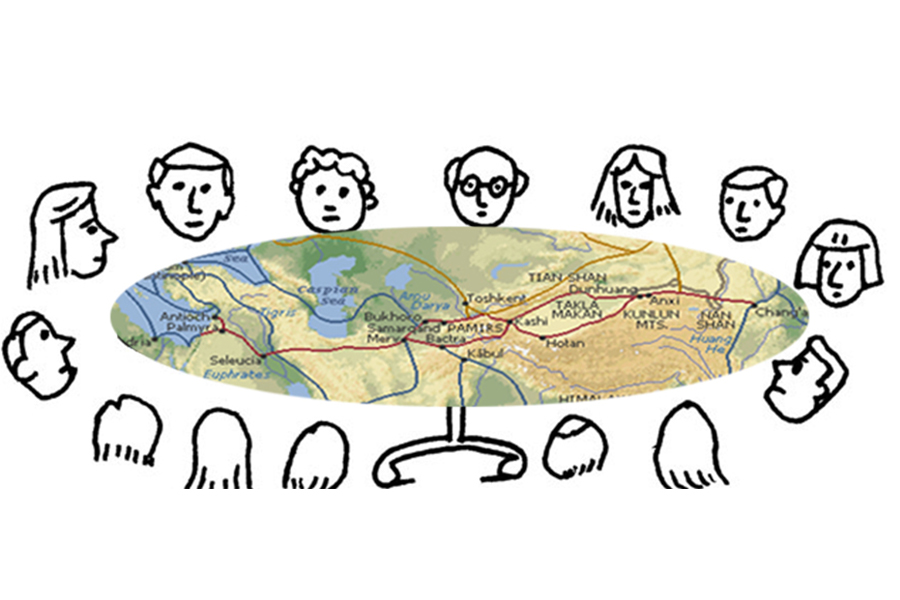The Inner Asian and Uralic National Resource Center at Indiana University launched the Area Studies Advancement Project (ASAP) earlier this year as part of the new initiatives supported over the next four years by funding from the U.S. Department of Education Title VI National Resource Center program. This new program opens new possibilities to increase the impact of Inner Asian and Uralic studies and builds upon a strong foundation in area studies teaching, learning, and research at IU. This project will also create opportunities to solidify linkages with the center’s Minority-Serving Institutional and community college partners.
Nurturing the creation of a new faculty community lies at the heart of ASAP, and the Center will serve a crucial role in facilitating this process. The lead faculty member overseeing the project is Gardner Bovingdon, Associate Professor in the Departments of Central Eurasian Studies, East Asian Languages and Cultures, and International Studies in the Hamilton Lugar School of Global and International Studies. Bovingdon will harness his wealth of experience as a researcher in Xinjiang and Kazakhstan as well as an accomplished teacher and mentor of undergraduate and graduate students to guide colleagues through a thorough inquiry into the nature of area studies and its role at IU. As part of this process, ASAP participants will tackle three main questions:
- What is an area studies approach to scholarship and does that approach offer a distinctive contribution to the production of scholarly knowledge?
- How can careful study of the approaches that help scholars succeed at area studies research lead to better and more effective student learning in area studies at the undergraduate and graduate level?
- What are the common challenges to teaching using an area studies approach at the undergraduate and graduate level? What methods informed by scholarly practice within area studies help overcome those challenges? What are the most effective means whereby those methods are taught to students at all levels?
ASAP will provide several venues for faculty to discuss these questions with one another and consult with colleagues from other institutions. As lead faculty member, Bovingdon will recruit a core faculty working group and convene regular meetings each semester. This faculty group will have a diverse membership that draws on the strengths of many schools and departments across IU in order to ensure that a variety of perspectives are included in the ongoing dialogue. ASAP will also sponsor a workshop every other year that will provide a forum for the faculty working group to broaden its conversation to include one or more guest speakers who will stimulate the group to think about the core questions in new, productive ways. The meetings and workshops will serve as the preliminary steps toward a conference in the fourth year, where members of the faculty working group and colleagues from other institutions will share their provisional responses to the core questions in a public forum. The faculty working group will seek to include IU graduate students with an interest in the core questions to participate in its public activities to aid in the development of students as scholars and teachers. In addition, the ASAP will invite faculty members from MSI/CC partner institutions with a keen interest in teaching and learning in area studies courses to join the faculty working group.
Within the next four years, participants in ASAP will strive to accomplish three major goals:
- Put forth a cogent intellectual charter that explains the inspiration for, value of, and identity as professionals engaged the pursuit of knowledge through an area studies framework.
- Forge connections among faculty, staff, and graduate students across IU and at partner institutions who are engaged in area studies.
- Foster an intellectual environment in which faculty and students cross traditional intellectual and physical boundaries to create a new generation of globally ready students.
ASAP is the next step in a process that began four years ago when the Center supported the development of courses intended to enhance training not only in regional languages and content, but also in the practical and intellectual questions surrounding area studies as an approach to knowledge. These efforts included working with area studies librarians at IU librarians and the School of Informatics, Computing, and Engineers to create a new course on area studies librarianship. The Center also collaborated with the Department of Central Eurasian Studies and Gardner Bovingdon to create a course for graduate students entitled “Teaching Area Studies.” Using course content that highlights the field of Central Eurasian Studies, this course provides a rigorous introduction to the birth of area studies as an academic field and challenges students to develop an individual pedagogical approach as part of their own scholarly development.
ASAP also takes advantage of existing linkages with partner Minority-Serving Institution and community colleges that have solidified through a sustained joint effort to internationalize curriculum through the introduction of Inner Asian and Uralic content. The most effective component of this effort has been through course development stipends, which have supported eight faculty members at different institutions to design new courses or redesign existing courses. Over the next four years, IAUNRC will continue this work by collaborating closely with IU’s Russian and East European Institute (REEI) to administer the next four rounds of a national competition for course development stipends for faculty at Minority-Serving Institutions or community colleges who wish to integrate Eurasian content into new or existing courses. This competition is supported by a consortium of other National Resource Centers.
Any questions regarding ASAP should be directed to Gardner Bovingdon (gbovingd@iu.edu) or the IAUNRC’s ASAP Program Coordinator Brian Cwiek (bcwiek@iu.edu).


